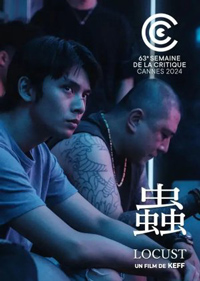Code of Silence: KEFF Revisits Time of Turmoil
 For his directorial debut, KEFF revisits the pinnacle of turmoil during the 2019 Hong Kong protests as a backdrop for a pseudo gangland thriller and romantic drama in Locust. Much like its protagonist, a mute young man in-between two distinct worlds, it’s a film set in the eye of this storm. But those who stand for nothing fall for anything, which seems to be the moral code threaded between these themes in a country wobbling on the precipice of political erosion. The story takes place across the strait in Taipei, when, in June of 2019, a thin membrane between these realms suddenly erodes, and the disastrous energy out of Hong Kong touches down in this other house which has inherited the wind. While altogether watchable, KEFF’s narrative doesn’t pack any real punches, nor does it yield any surprises in this eternal tale of the haves and have nots navigating a system rife with distraction and corruption.
For his directorial debut, KEFF revisits the pinnacle of turmoil during the 2019 Hong Kong protests as a backdrop for a pseudo gangland thriller and romantic drama in Locust. Much like its protagonist, a mute young man in-between two distinct worlds, it’s a film set in the eye of this storm. But those who stand for nothing fall for anything, which seems to be the moral code threaded between these themes in a country wobbling on the precipice of political erosion. The story takes place across the strait in Taipei, when, in June of 2019, a thin membrane between these realms suddenly erodes, and the disastrous energy out of Hong Kong touches down in this other house which has inherited the wind. While altogether watchable, KEFF’s narrative doesn’t pack any real punches, nor does it yield any surprises in this eternal tale of the haves and have nots navigating a system rife with distraction and corruption.
An early news story about the protests in Hong Kong yields less interest to a pair of distracted Taipei students in a laundromat than a puff piece about a new popular restaurant’s dessert, the ‘Taiwan eclair,’ so in demand it seems almost impossible to try one unless one has frivolous hours to stand in line. It seems one more glaring reminder to noodle shop owner Ah-Rong (Yu An Shun) and his wife Yu-Jie (Wu Yi-Jung) that their family business, though surviving, will never be the popular hot spot they need it to be. They employ a young, mute man named Zhong-Han (Liu Wei Chen), who hails from the same home town as Yu-Jie, also serving as the couple’s surrogate son. Unbeknownst to them, Zhong-Han also moonlights as a thug for a local gang run by Kobe (Devin Pan), who collect debts from local businesses and individuals for murky entities who utilize their services. Lately, Kobe’s gang has decided to begin targeting elitist men they see in nightclubs to exact vengeance against the wealthy, a la Robin Hood. But Zhong-Han has grown weary of this lifestyle, gravitating towards the beautiful and friendly I-ju (Rimong Ihwar), who works at a local convenience store. As their attraction blossoms, trouble begins for Ah-Rong, as the landlord has sold the building to a new businessman whose goal is to scare them out of their establishment so he can re-develop the area.
While Zhong-Han holds this narrative completely on his shoulders, we never really get a sense of his character, despite Liu Wei Chen’s inviting screen presence. His nefarious activities and the impending doom of Ah-Rong’s restaurant immediately clues us in to the kind of collision course Locust has in store, which robs the narrative of any real tragedy. If anything, we tend to gravitate towards the plight of the restaurateurs more so than Zhong-Han, whose predictable romance with Ihwar’s somewhat superficial character is pretty standard melodramatic fare.
Holy Spider cinematographer Nadim Carlsen’s nighttime sequences in Taipei creates a compelling visual palette, and these moments sometimes settle quite nicely into sleazy, underbelly tendencies. But there’s a sense of grittiness absent from the narrative which could have gone a long way towards heightening a compelling trajectory for the film’s silent witness, who at last takes a stand that’s arguably too little, too late despite the level of sacrifice he chooses.
Reviewed on May 16th at the 2024 Cannes Film Festival – Critics’ Week. 135 Mins.
★★½/☆☆☆☆☆


